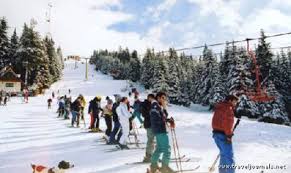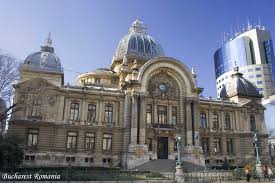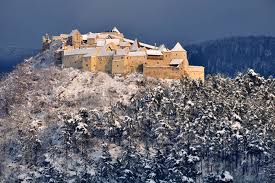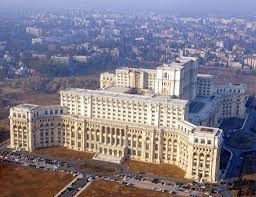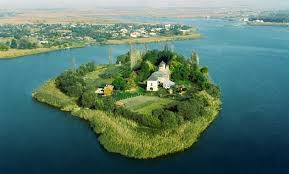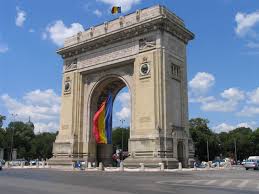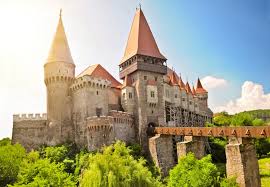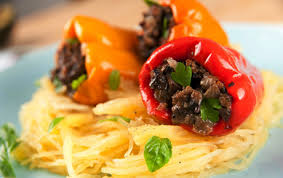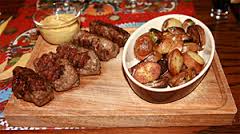Geography
Modern Romania emerged within the territories of the ancient Roman province of Dacia, and was formed in 1859 through a personal union of the principalities ofMoldavia and Wallachia. The new state, officially named Romania since 1866, gained independence from the Ottoman Empire in 1877. At the end of World War I,Transylvania, Bukovina and Bessarabia united with the sovereign Kingdom of Romania. At the end of World War II, territories which today roughly correspond to theRepublic of Moldova were occupied by the Soviet Union, and a few years later Romania became a socialist republic and member of the Warsaw Pact. After the 1989 Revolution, Romania began a transition back towards democracy and a capitalist market economy.
Following rapid economic growth in the 2000s, Romania has an economy predominantly based on services, and is a producer and net exporter of machines and electric energy, featuring companies like Automobile Dacia and OMV Petrom. Living standards have improved, and currently, Romania is an upper-middle income country with a high Human Development Index. It has been a member of NATO since 2004, and part of the European Union since 2007. Around 90% of the population identify themselves as Eastern Orthodox Christians, and are native speakers of Romanian, a Romance language. With a rich cultural history, Romania has been the home of influential artists, musicians, inventors and sportsmen, and features a variety of tourist attractions.
Population
About 89.4% of the people of Romania are ethnic Romanians, whose language, Romanian, is an Eastern Romance language, descended primarily from Latin with some Bulgarian, Serbian, German, Greek, Hungarian and Turkish borrowings. Romanians are by far the most numerous group of speakers of an Eastern Romance language today. It has been said that they constitute "an island of Latinity" in Eastern Europe, surrounded on all sides either by Slavic peoples or by the Hungarians.
Transport
As a densely populated country in a central location in Central-Southeastern Europe and with a developed economy, Romania has a dense and modern transportation infrastructure.
Transportation infrastructure in Romania is the property of the state, and is administered by the Ministry of Transports, Constructions and Tourism, except when operated as a concession, in which case the concessions are made by the Ministry of Administration and Interior.
Railway: A fast-growing number of Romanias major cities have modern tram or light rail networks, including Bucharest, Cluj-Napoca Oradea. Recently the tram has seen a very big revival with many experiments such as ground level power supply in Oradea.
Highway: According to CIA Factbook, Romania total road network is estimated to be 198,817 km long, out of which 60,043 km are paved and 138,774 km (2004) are unpaved. The World Bank estimates that the road network that is outside of cities and communes (i.e. excluding streets and village roads) is about 78,000 km long.
Airport: According to CIA Factbook, Romania total road network is estimated to be 198,817 km long, out of which 60,043 km are paved and 138,774 km (2004) are unpaved. The World Bank estimates that the road network that is outside of cities and communes (i.e. excluding streets and village roads) is about 78,000 km long.
Greetings
|
English |
limba română (Romanian) |
|
Bine ai venit (inf) |
|
|
Hello (on phone) |
|
|
Ce mai faci? (inf) |
|
|
Reply to How are you? |
|
|
Reply to thank you |
|
|
Dorești să dansezi cu mine? (inf) |
|
|
ÎnsănătoÈ™ire grabnică! |
|
|
Whats the weather like? |
Cum e vremea? |
|
Is it going to rain? |
O să plouă? |
|
Why are you laughing? |
De ce râdeÈ›i? |
|
Where shall we meet? |
Unde ne întîlnim? |
|
What time shall I come? |
La ce oră să vin? |
|
I am on my own |
Sunt singur |
|
I am British |
Sunt britanic |
|
What is in it? |
Ce conține? |
|
Im allergic to ... |
Sunt alergic la ... |
|
Wow! |
Extraordinar! |
Language difficulties
I understand |
Am înÅ£eles |
|
Poţi să repeţi, te rog? (inf) |
|
|
Do you speak Romanian? |
|
|
Yes, a little |
|
|
I cant speak Romanian [well] |
Nu vorbesc [bine] româneÈ™te |
|
Vorbiți engleză? |
|
|
Is there someone here who speaks English? |
Vorbește cineva aici engleză? |
|
How do you say ... in Romanian? |
|
|
Is my Romanian so bad? |
Vorbesc aÈ™a de prost româneÈ™te? |
Sights
Cuisine
Posters
Map
Itineraries
| Sr. No. | Itinerary Name | File |

